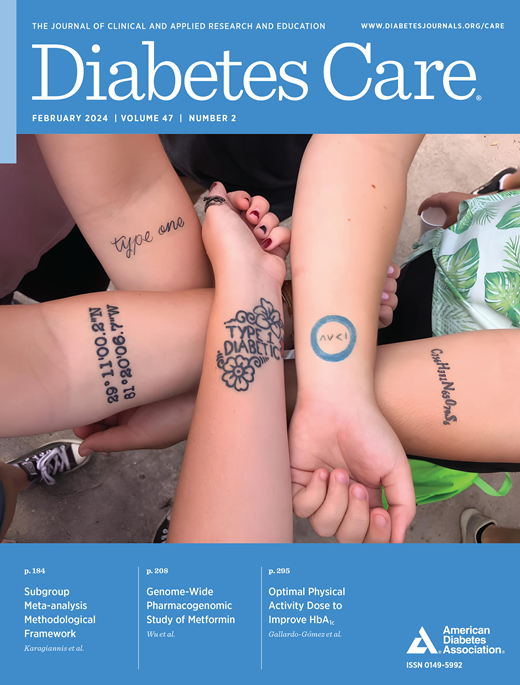Effectiveness of Low Intensity Mental Health Support via a Telehealth Enabled Network (LISTEN) for Adults With Diabetes Distress: A Parallel Group, Pragmatic Randomized Controlled Trial
IF 16.6
1区 医学
Q1 ENDOCRINOLOGY & METABOLISM
引用次数: 0
Abstract
OBJECTIVE To assess the effectiveness of Low Intensity mental health Support via a Telehealth Enabled Network (LISTEN), facilitated by diabetes health professionals, for reducing diabetes distress among adults with type 1 or type 2 diabetes. RESEARCH DESIGN AND METHODS A two-arm, parallel group, pragmatic randomized controlled trial. Adults with diabetes distress (20-item Problem Areas in Diabetes [PAID] score ≥25, or ≥2 on three or more items) were recruited via the National Diabetes Services Scheme (NDSS) and randomized (1:1) via central randomization by computer to LISTEN (maximum four sessions of problem-solving therapy) or usual care (web-based resources about diabetes and emotional health). Participants completed self-report online surveys at baseline and at 8 and 26 weeks. The primary outcome was the change in diabetes distress (PAID) from baseline to 26 weeks. Secondary outcomes included psychological distress (10-item Kessler Psychological Distress Scale), general emotional well-being (World Health Organization 5-item Well-being Index) and coping self-efficacy at 8 and 26 weeks. Data were analyzed using intention-to-treat principles. RESULTS Participants (n = 429, 59% women, 40% men, 1% nonbinary; median age 54 [interquartile range 42.0–63.5]; 37% type 1 diabetes, 63% type 2 diabetes) were enrolled and randomized to the intervention (n = 216) or control group (n = 213). Over 26 weeks, there was a greater reduction in diabetes distress among the LISTEN group versus the control group (mean difference −7.2 [95% CI −11.6, −2.8]; P < 0.001; Cohen f2 = 0.03) and greater improvements in general emotional well-being and coping self-efficacy. No adverse events were reported. CONCLUSIONS LISTEN is an effective, low-intensity program, addressing the unmet needs of adults with type 1 and type 2 diabetes experiencing mild-to-moderate diabetes distress.通过远程医疗网络(LISTEN)对糖尿病患者低强度心理健康支持的有效性:一项平行组、实用随机对照试验
目的:通过远程医疗支持网络(LISTEN),在糖尿病卫生专业人员的协助下,评估低强度心理健康支持在减少成人1型或2型糖尿病患者的糖尿病困扰方面的有效性。研究设计与方法:两组、平行组、实用随机对照试验。通过国家糖尿病服务计划(NDSS)招募患有糖尿病困扰的成年人(20项糖尿病问题领域[PAID]得分≥25,或三项或多项得分≥2),并通过计算机中央随机化(1:1)随机分配到LISTEN(最多四次解决问题治疗)或常规护理(关于糖尿病和情绪健康的网络资源)。参与者在基线、8周和26周时完成了在线自我报告调查。主要结局是糖尿病窘迫(PAID)从基线到26周的变化。次要结果包括8周和26周时的心理困扰(10项凯斯勒心理困扰量表)、一般情绪健康(世界卫生组织5项幸福指数)和应对自我效能。使用意向治疗原则对数据进行分析。结果参与者(n = 429),女性59%,男性40%,非二元1%;中位年龄54岁[四分位数间距42.0-63.5];37% 1型糖尿病患者,63% 2型糖尿病患者)被纳入研究,随机分为干预组(n = 216)和对照组(n = 213)。在26周内,与对照组相比,LISTEN组糖尿病痛苦的减少幅度更大(平均差异为- 7.2 [95% CI - 11.6, - 2.8];P, lt;0.001;Cohen f2 = 0.03),总体情绪幸福感和应对自我效能有更大的改善。无不良事件报告。LISTEN是一个有效的、低强度的项目,解决了经历轻中度糖尿病困扰的1型和2型糖尿病成人患者未满足的需求。
本文章由计算机程序翻译,如有差异,请以英文原文为准。
求助全文
约1分钟内获得全文
求助全文
来源期刊

Diabetes Care
医学-内分泌学与代谢
CiteScore
27.80
自引率
4.90%
发文量
449
审稿时长
1 months
期刊介绍:
The journal's overarching mission can be captured by the simple word "Care," reflecting its commitment to enhancing patient well-being. Diabetes Care aims to support better patient care by addressing the comprehensive needs of healthcare professionals dedicated to managing diabetes.
Diabetes Care serves as a valuable resource for healthcare practitioners, aiming to advance knowledge, foster research, and improve diabetes management. The journal publishes original research across various categories, including Clinical Care, Education, Nutrition, Psychosocial Research, Epidemiology, Health Services Research, Emerging Treatments and Technologies, Pathophysiology, Complications, and Cardiovascular and Metabolic Risk. Additionally, Diabetes Care features ADA statements, consensus reports, review articles, letters to the editor, and health/medical news, appealing to a diverse audience of physicians, researchers, psychologists, educators, and other healthcare professionals.
 求助内容:
求助内容: 应助结果提醒方式:
应助结果提醒方式:


